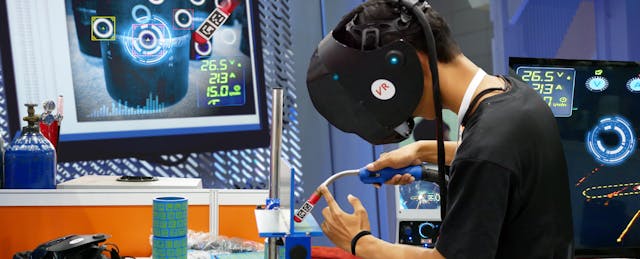In an economy under the grip of the first global pandemic in a century, money is flowing to companies offering innovative responses to age-old problems.
Among them is TRANSFR Inc., which uses virtual reality to deliver workplace training and skills development. The New York-based company has raised $12 million in a Series A funding round to support its efforts to bring virtual solutions to very real challenges.
“What we essentially do is create training simulations in virtual reality that enables someone to kind of do a pre-apprenticeship program, in VR. So they do the job before they get the job,” explained Bharanidharan Rajakumar, TRANSFR founder and CEO.
Rajakumar founded TRANSFR in 2017 after an epiphany moment trying a VR headset at a gaming conference “and just thinking, ‘Holy cow, this is unbelievable,’” he recalled. He was previously the founder and CEO of LearnBop, a math instructional program, that was acquired by K12 Inc., the publicly traded online education provider.
The company works with education, government and industry partners to design and deliver simulated training in middle-skill jobs—those requiring more education than a high school diploma but less than a four-year college degree. The content is delivered via Oculus Quest through Facebook’s Oculus for Business virtual reality platform.
“You can put on the headset and you enter a virtual training facility, with the equipment that you would normally see in a physical training facility,” Rajakumar said.
Working with employers to craft training materials helps align the content to job requirements, according to the company. Coaching and examinations within the VR experience further reinforce concepts to ensure that whatever users learn to do in virtual reality, they can also do in real life—even if the training location might be far removed from any physical equipment or production line.
“The core focus of what we do is authenticity,” Rajakumar said. “When [students] take off the headset, they will be asked by the employer, ‘Can you show me how to use this tool or use this machine or do this process or procedure?’ and the people need to be able to do that.”
The result is a training regimen that provides ‘hands-on’ experience in a virtual environment that can potentially be delivered anywhere with an internet connection. Employers can then integrate skilled hires more quickly into the workforce and help them hit the ground running. In an economy still adjusting to COVID-19, with millions unemployed or entering new jobs, those cost and time savings are even more valuable.
The Series A funding round is led by Firework Ventures, which joins existing investors including Album VC, Imagination Capital, former world number one golfer Greg Norman, Stuart Udell (the former CEO of K12 who is currently CEO of Achieve3000), Tampa Bay Lightning owner Jeff Vinik and Degreed founder David Blake.
Firework is led by veteran investor Brigette Lau and Ashley Bittner and focuses investments on human-centered, future-of-work companies. Bittner is a former U.S. Department of Education appointee and is joining the TRANSFR board of directors.
“We’re really excited to help scale this technology further,” said Bittner, founding partner at Firework. The investment decision, she adds, was “very much driven by our thesis around middle skills, the efficacy of the product, the [geographic] areas they serve and how we view that as a really unique market opportunity.”
The investment from Firework will help TRANSFR expand across the US, and offer more training opportunities in more sectors, Rajakumar said.
To date, the company’s biggest impact has been felt in Alabama.
Working with the state’s workforce development agency, the Alabama Department of Training (AIDT) and corporate clients including Lockheed Martin and Mazda Toyota, TRANSFR developed training programs leading to direct employment opportunities. Together with Alabama Power, TRANSFR created an initiative, JumpStartAL, to scale this effort state-wide.
In a Lockheed Martin VR training program of 20 students, everyone was offered jobs, and 90 percent were still employed six months later. This resulted in an estimated cost saving of 50 percent for Lockheed, according to a TRANSFR study.
TRANSFR training programs have also been offered in Alabama schools and community colleges to provide a pathway from education direct to secure, well-paid, skilled job opportunities. Alabama faces a potential shortfall of 199,000 skilled workers by 2026 that, if unaddressed, could reach 243,000 by 2030 according to state data.
“Making skills training more accessible, relevant and engaging can help to bring technical careers to life and open them up to workers in search of their next step,” said Ed Castille, Alabama deputy secretary of commerce and director of AIDT. “This work is helping to bridge the gap between unemployed workers and hands-on, technical skills training required in fast-growing fields across our state.”
New uses for virtual reality are emerging all the time. But in a remote learning and work era necessitated by COVID-19, the technology is particularly enticing to companies, investors and learners who are looking for new ways to unlock learning opportunities. Especially if they lead to a job.
“When I first started the company, I told our investors, ‘I have no clue what this is going to look like in five years. But I can tell you this, whoever gets in right now is gonna have the best chance of figuring it out,’” Rajakumar said.
“And I can tell you that a year from now, it's gonna look totally different than it looks today.”


